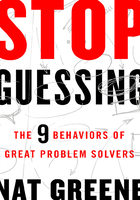
THE CURSE OF LUCK
Imagine Sherlock Holmes trying to catch a serial killer with guessing. “Maybe it was the butler!” So we throw the butler in jail, but the serial killer strikes again! “Perhaps it was that shady fellow!” Six murders later we have seven more people behind bars waiting for the circus to end, but Sherlock has another hunch. “Maybe it was the chief of police!” At that point everyone rolls their eyes and tells Sherlock that he’d better not quit his day job. The practice of guessing so obviously fails in detective work that it’s almost shocking that we guess when we have important problems to solve.
But let’s say you guess, and you get lucky: You found a solution and implemented it effectively. You may or may not have spent a lot of time and resources on it. Unfortunately, some bad side effects come with this rare victory.
First, you’ve reinforced the habit of guessing in your mind or in your organization, fooled yourself into thinking it’s a good strategy and is going to work again, and made the habit harder to break in the future. Whether or not it works, it’s easy, and we find comfort in that.
Second, you haven’t developed a deeper understanding of whatever you’re trying to fix, whether it’s yourself, a process, or a machine. Instead of spending time building some knowledge of the fundamentals that you can use in the future—new problems are popping up all the time—you’ve spent your time guessing and checking. So next time there’s a problem, you’re back to square one.
Third, and perhaps most importantly, you’re not becoming a better problem-solver. While guessing might eventually get the job done for problems of moderate difficulty (although at great cost), you rob yourself or your team of critical skills development. When you get to truly hard problems, you’re going to need all of the skill you can get: If you don’t practice using the right behaviors and method to solve moderate problems then you will never master them, and you’re going to get shellacked when you try to tackle the hard ones.